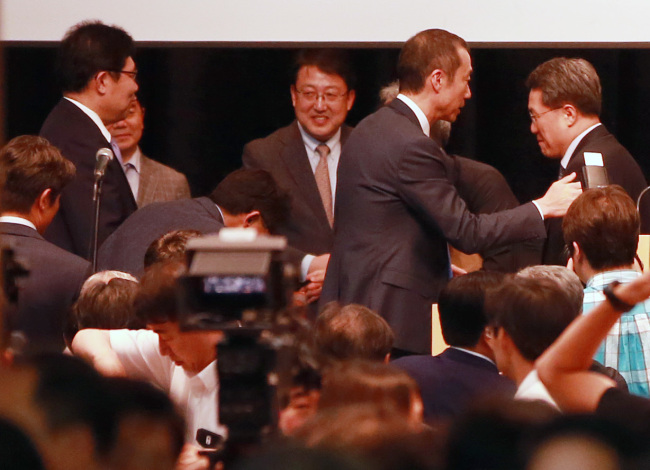Shareholders’ approval of the merger between Samsung C&T and Cheil Industries has paved the way for the creation of a global all-around construction, trade, fashion, chemical, leisure and biopharmaceutical juggernaut posting 60 trillion won ($59 billion) in sales by 2020.
C&T president and co-CEO Choi Chi-hun said Friday that the merged company would see a rise of about 1 trillion won in sales in the construction sector, a 2.9 trillion won jump in the trade and retail sector, a 2 trillion won rise in biopharmaceutical businesses by the same time, and would benefit its shareholders.

Samsung C&T executives celebrate after shareholders approved its merger with Cheil Industries on Friday. (Yonhap)
"In such hard times when Samsung faces global challenges from all sides, the merger will allow the company to become stronger and competitive,” Choi said after the merger proposal was passed.
Apart from the investors’ interest, Samsung’s founding family became one step closer to cementing its leadership transfer.
While Samsung heir apparent Lee Jay-yong has a tiny grasp of Samsung Group’s flagship Samsung Electronics with 0.57 percent, Samsung C&T owns a 4.1 percent stake in Samsung Electronics and is the second-largest stakeholder. Then again, Lee hardly owns a Samsung C&T share but instead owns 23.23 percent of Cheil Industries, the de facto holding company of Samsung Group.
And through the merger of C&T and Cheil, Lee will be able to grab 16.5 percent of the new C&T and rise as the largest shareholder there, thus gaining easy control of the electronics arm and moreover, the entire Samsung Group.
The merger also brought public attention to the so-called vulture fund managements, represented by Elliott Associates, the third-largest shareholder of C&T which has constantly opposed the merger.
By obtaining substantial stakes, such overseas-based funds have been able to push for or against managerial issues and thereby raise share values in the short term, and then sell the stakes for large profits.
Though not illegal, such acts that have repeatedly appeared in the Korean corporate scene, such as Sovereign Asset’s challenge against the SK Group management in 2003 and Icahn Partners’ deal with shares of KT&G in 2006, and provoked public outrage against “foreigners” who “dine and dash” at Korean corporations’ expense.
Samsung C&T CEO Kim Shin told reporters that he has “come to realize the importance of adopting a protection system for managerial rights.” Some economists called for the legalization of “poison pill” procedures, while stock analysts said business tycoons would likely ask the government to loosen regulations on circular governance structures in order to strengthen their hold over at the board rooms.
The tantrum surrounding the merger took a turn for the worse when Samsung had to face numerous legal oppositions including injunctions filed by Elliott until the last minute. Though it ended unsuccessfully, a series of lawsuits have revealed weaknesses in both Samsung’s managerial and risk management abilities -- Korean business conglomerates’ common business practices of dominating the management with marginal shares of their companies has always left them open to such attacks.
News that about 5,000 C&T workers are reportedly making door-to-door visits asking for votes or letters of attorney in favor of the merger spread rapidly online.
At the shareholders meeting, angry investors warned of an invasion of privacy regarding the issue. Another shareholder asked all listed executives to step down for “tarnishing the image of the great company.”
“I will vote for the merger, only because I am a Korean and don’t want foreign intervention to discern an important decision. But this is the last time!” a frustrated voter said.
For Samsung, it may be too early to pop the champagne. Observers suggest that Texas-based Elliott Associates and its followers might be resilient in their opposition.
The Citizens’ Coalition for Economic Justice pointed out that Elliott might plan to file for an investor-state dispute settlement against the merger with the argument that the state-operated National Pension Fund’s support for the merger could be interpreted as government intervention.
Elliott’s acquisition of stakes in Samsung SDI and Samsung Fire and Marine Insurance, both major shareholders of C&T, shows the fund management’s willingness to closely monitor the company operations for a while, they say.
“Elliott is disappointed that the takeover appears to have been approved against the wishes of so many independent shareholders, and reserves all options at its disposal,” Elliott stated Friday.
By Bae Ji-sook (
baejisook@heraldcorp.com)





![[KH Explains] No more 'Michael' at Kakao Games](http://res.heraldm.com/phpwas/restmb_idxmake.php?idx=645&simg=/content/image/2024/04/28/20240428050183_0.jpg&u=20240428180321)
